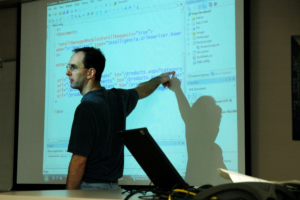Vânia Gomes Zuin, Associate professor at the Federal University of São Carlos, São Carlos, SP, Brazil, and visiting professor at the University of York (UK) and Leuphana University, Germany.
Antônio Alvaro Soares Zuin, Full professor at the Department of Education at the Federal University of São Carlos, São Carlos, SP, Brazil and visiting professor at the Goethe-Universität, Frankfurt, Germany.

Image: Wonderlane on Unsplash
The paper “A autoridade pedagógica diante da tecnologia algorítmica de reconhecimento facial e vigilância” (The pedagogical authority facing the algorithmic facial recognition technology and surveillance), published in the Educação & Sociedade journal (vol. 41), addresses ways in which the teacher, as a pedagogical authority, becomes a key element for students’ formation (Bildung). The concept of authority, surveillance and control should be reflected upon in the classroom in the age of digital culture, based on data obtained from algorithmic facial and body recognition technologies, which urges us to question where, who or what holds this pedagogical authority nowadays.
Currently, practices can be found to replace a teacher’s “functions” with machines that correct tests or exams in universities in increasingly flexible modalities of classroom and partial-classroom teaching, as well as distance learning. Furthermore, an application called “Professor Uber” (ubereducation) was developed enabling teachers to work on an hourly basis, being paid according to the class given. Analysing this, to what extent is all this beneficial or detrimental to the student’s teaching-learning and formation process?
Robots can also be used for various purposes, such as algorithmic search and filtering technology and information classification, applying them to a wide range of knowledge areas. As far as the educational sphere is concerned, there is no denying the pedagogical potential derived from software, whose algorithms allow information and images on any subject to be obtained in less than one second. Therefore, the amount of insights that can immediately be gained from relationships established in the classroom between teachers and students can never be neglected.
Human beings, as social beings, and algorithmic technologies need to go at the same pace focusing on the search process and discussing digitally obtained information and images. Technology will indeed help the function of the teacher, but it will never replace the act of teaching. We will move towards a new level in teacher-student/student-teacher relationships, as an updated form of pedagogical authority. A teacher’s work requires professionals to have “almost superhuman” levels of empathy and organisation, therefore it would be a great challenge to create robot teachers. What needs to be reinforced is that relationships will change, but the teacher will never be replaced by a robot.
The podcast features an in-depth discussion on the subject including current pandemic issues and future prospects.
References
KÜMMERER, K.; CLARK, J. H.; ZUIN, V. G. Rethinking chemistry for a circular economy. Science [online]. 2020, vol. 367, no. 6476, pp. 369-37024, ISSN: 1095-9203 [viewed 26 May 2020]. DOI: 10.1126/science.aba4979. Avaliable from: https://science.sciencemag.org/content/367/6476/369
ZUIN, V.G. and BORGONOVE, C.M. Environmental education in distance learning in Environmental Engineering at Federal University of São Carlos, Brazil: potentialities and limitations towards a critical techno-scientific education. Brazilian Journal of Science and Technology [online]. 2016, vol. 3, pp. 1-14, e-ISSN: 2196-288X [viewed 26 May 2020]. DOI: 10.1186/s40552-016-0020-9. Avaliable from: https://bit.ly/2YLY0Qf
ZUIN, V.G. and ZUIN, A.A.S. A formação no tempo e no espaço da internet das coisas. Educ. Soc. [online]. 2016, vol. 37, no. 136, pp. 757-773, ISSN: 1678-4626 [viewed 26 May 2020]. DOI: 10.1590/es0101-73302016167198. Available from: http://ref.scielo.org/mrgk8t
ZUIN, A.A.S. Cyberbullying contra professores: dilemas da autoridade dos educadores na era da concentração dispersa. São Paulo: Edições Loyola, 2017.
ZUIN, V.G. Environments: technoscience and its relation to sustainability, ethics, aesthetics, health and the human future. São Carlos: EdUFSCar, 2018. v. 1.
To read the article, access
ZUIN, V.G. and ZUIN, A.Á.S. A autoridade pedagógica diante da tecnologia algorítmica de reconhecimento facial e vigilância. Educ. Soc. [online]. 2020, vol. 41, e233820. ISSN: 1678-4626 [viewed 5 June2020]. DOI: 10.1590/es.233820. Avalaible from: http://ref.scielo.org/9tv4n3
External links
Educação & Sociedade – ES: www.scielo.br/es
Online courses
https://cursos.poca.ufscar.br/course/view.php?id=64
https://cursos.poca.ufscar.br/course/view.php?id=25
Como citar este post [ISO 690/2010]:













Recent Comments